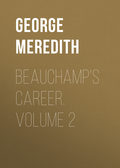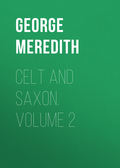
George Meredith
Beauchamp's Career. Volume 7
CHAPTER LI
IN THE NIGHT
The delirious voice haunted him. It came no longer accompanied by images and likenesses to this and that of animate nature, which were relieving and distracting; it came to him in its mortal nakedness—an afflicting incessant ringing peal, bare as death's ribs in telling of death. When would it stop? And when it stopped, what would succeed? What ghastly silence!
He walked to within view of the lights of Dr. Shrapnel's at night: then home to his hotel.
Miss Denham's power of commanding sleep, as he could not, though contrary to custom he tried it on the right side and the left, set him thinking of her. He owned she was pretty. But that, he contended, was not the word; and the word was undiscoverable. Not Cecilia Halkett herself had so high-bred an air, for Cecilia had not her fineness of feature and full quick eyes, of which the thin eyelids were part of the expression. And Cecilia sobbed, snifed, was patched about the face, reddish, bluish. This girl was pliable only to service, not to grief: she did her work for three-and-twenty hours, and fell to her sleep of one hour like a soldier. Lord Romfrey could not recollect anything in a young woman that had taken him so much as the girl's tossing out of the rug and covering herself, lying down and going to sleep under his nose, absolutely independent of his presence.
She had not betrayed any woman's petulance with him for his conduct to her uncle or guardian. Nor had she hypocritically affected the reverse, as ductile women do, when they feel wanting in force to do the other. She was not unlike Nevil's marquise in face, he thought: less foreign of course; looking thrice as firm. Both were delicately featured.
He had a dream.
It was of an interminable procession of that odd lot called the People. All of them were quarrelling under a deluge. One party was for umbrellas, one was against them: and sounding the dispute with a question or two, Everard held it logical that there should be protection from the wet: just as logical on the other hand that so frail a shelter should be discarded, considering the tremendous downpour. But as he himself was dry, save for two or three drops, he deemed them all lunatics. He requested them to gag their empty chatter-boxes, and put the mother upon that child's cry.
He was now a simple unit of the procession. Asking naturally whither they were going, he saw them point. 'St. Paul's,' he heard. In his own bosom it was, and striking like the cathedral big bell.
Several ladies addressed him sorrowfully. He stood alone. It had become notorious that he was to do battle, and no one thought well of his chances. Devil an enemy to be seen! he muttered. Yet they said the enemy was close upon him. His right arm was paralyzed. There was the enemy hard in front, mailed, vizored, gauntleted. He tried to lift his right hand, and found it grasping an iron ring at the bottom of the deep Steynham well, sunk one hundred feet through the chalk. But the unexampled cunning of his left arm was his little secret; and, acting upon this knowledge, he telegraphed to his first wife at Steynham that Dr. Gannet was of good hope, and thereupon he re-entered the ranks of the voluminous procession, already winding spirally round the dome of St. Paul's. And there, said he, is the tomb of Beauchamp. Everything occurred according to his predictions, and he was entirely devoid of astonishment. Yet he would fain have known the titles of the slain admiral's naval battles. He protested he had a right to know, for he was the hero's uncle, and loved him. He assured the stupid scowling people that he loved Nevil Beauchamp, always loved the boy, and was the staunchest friend the fellow had. And saying that, he certainly felt himself leaning up against the cathedral rails in the attitude of Dr. Shrapnel, and crying, 'Beauchamp! Beauchamp!' And then he walked firmly out of Romfrey oakwoods, and, at a mile's distance from her, related to his countess Rosamund that the burial was over without much silly ceremony, and that she needed to know nothing of it whatever.
Rosamund's face awoke him. It was the face of a chalk-quarry, featureless, hollowed, appalling.
The hour was no later than three in the morning. He quitted the detestable bed where a dream—one of some half-dozen in the course of his life-had befallen him. For the maxim of the healthy man is: up, and have it out in exercise when sleep is for foisting base coin of dreams upon you! And as the healthy only are fit to live, their maxims should be law. He dressed and directed his leisurely steps to the common, under a black sky, and stars of lively brilliancy. The lights of a carriage gleamed on Dr. Shrapnel's door. A footman informed Lord Romfrey that Colonel Halkett was in the house, and soon afterward the colonel appeared.
'Is it over? I don't hear him,' said Lord Romfrey.
Colonel Halkett grasped his hand. 'Not yet,' he said. 'Cissy can't be got away. It's killing her. No, he's alive. You may hear him now.'
Lord Romfrey bent his ear.
'It's weaker,' the colonel resumed. 'By the way, Romfrey, step out with me. My dear friend, the circumstances will excuse me: you know I'm not a man to take liberties. I'm bound to tell you what your wife writes to me. She says she has it on her conscience, and can't rest for it. You know women. She wants you to speak to the man here—Shrapnel. She wants Nevil to hear that you and he were friendly before he dies; thinks it would console the poor dear fellow. That's only an idea; but it concerns her, you see. I'm shocked to have to talk to you about it.'
'My dear colonel, I have no feeling against the man,' Lord Romfrey replied. 'I spoke to him when I saw him yesterday. I bear no grudges. Where is he? You can send to her to say I have spoken to him twice.'
'Yes, yes,' the colonel assented.
He could not imagine that Lady Romfrey required more of her husband. 'Well, I must be off. I leave Blackburn Tuckham here, with a friend of his; a man who seems to be very sweet with Mrs. Wardour-Devereux.'
'Ha! Fetch him to me, colonel; I beg you to do that,' said Lord Romfrey.
The colonel brought out Lydiard to the earl.
'You have been at my nephew's bedside, Mr. Lydiard?'
'Within ten minutes, my lord.'
'What is your opinion of the case?'
'My opinion is, the chances are in his favour.'
'Lay me under obligation by communicating that to Romfrey Castle at the first opening of the telegraph office to-morrow morning.'
Lydiard promised.
'The raving has ended?'
'Hardly, sir, but the exhaustion is less than we feared it would be.'
'Gannet is there?'
'He is in an arm-chair in the room.'
'And Dr. Shrapnel?'
'He does not bear speaking to; he is quiet.'
'He is attached to my nephew?'
'As much as to life itself.'
Lord Romfrey thanked Lydiard courteously. 'Let us hope, sir, that some day I shall have the pleasure of entertaining you, as well as another friend of yours.'
'You are very kind, my lord.'
The earl stood at the door to see Colonel Halkett drive off: he declined to accompany him to Mount Laurels.
In the place of the carriage stood a man, who growled 'Where's your horsewhip, butcher?'
He dogged the earl some steps across the common. Everard returned to his hotel and slept soundly during the remainder of the dark hours.
CHAPTER LII
QUESTION OF A PILGRIMAGE AND AN ACT OF PENANCE
Then came a glorious morning for sportsmen. One sniffed the dews, and could fancy fresh smells of stubble earth and dank woodland grass in the very streets of dirty Bevisham. Sound sleep, like hearty dining, endows men with a sense of rectitude, and sunlight following the former, as a pleasant spell of conversational ease or sweet music the latter, smiles a celestial approval of the performance: Lord Romfrey dismissed his anxieties. His lady slightly ruffled him at breakfast in a letter saying that she wished to join him. He was annoyed at noon by a message, wherein the wish was put as a request. And later arrived another message, bearing the character of an urgent petition. True, it might be laid to the account of telegraphic brevity.
He saw Dr. Shrapnel, and spoke to him, as before, to thank him for the permission to visit his nephew. Nevil he contemplated for the space of five minutes. He cordially saluted Miss Denham. He kissed Cecilia's hand.
'All here is going on so well that I am with you for a day or two to- morrow,' he despatched the message to his wife.
Her case was now the gravest. He could not understand why she desired to be in Bevisham. She must have had execrable dreams!—rank poison to mothers.
However, her constitutional strength was great, and his pride in the restoration of his House by her agency flourished anew, what with fair weather and a favourable report from Dr. Gannet: The weather was most propitious to the hopes of any soul bent on dispersing the shadows of death, and to sportsmen. From the windows of his railway carriage he beheld the happy sportsmen stalking afield. The birds whirred and dropped just where he counted on their dropping. The smoke of the guns threaded to dazzling silver in the sunshine. Say what poor old Nevil will, or did say, previous to the sobering of his blood, where is there a land like England? Everard rejoiced in his country temperately. Having Nevil as well,—of which fact the report he was framing in his mind to deliver to his wife assured him—he was rich. And you that put yourselves forward for republicans and democrats, do you deny the aristocracy of an oaklike man who is young upon the verge of eighty?
These were poetic flights, but he knew them not by name, and had not to be ashamed of them.
Rosamund met him in the hall of the castle. 'You have not deceived me, my dear lord,' she said, embracing him. 'You have done what you could for me. The rest is for me to do.'
He reciprocated her embrace warmly, in commendation of her fresher good looks.
She asked him, 'You have spoken to Dr. Shrapnel?'
He answered her, 'Twice.'
The word seemed quaint. She recollected that he was quaint.
He repeated, 'I spoke to him the first day I saw him, and the second.'
'We are so much indebted to him,' said Rosamund. 'His love of Nevil surpasses ours. Poor man! poor man! At least we may now hope the blow will be spared him which would have carried off his life with Nevil's. I have later news of Nevil than you.'
'Good, of course?'
'Ah me! the pleasure of the absence of pain. He is not gone.'
Lord Romfrey liked her calm resignation.
'There's a Mr. Lydiard,' he said, 'a friend of Nevil's, and a friend of Louise Devereux's.'
'Yes; we hear from him every four hours,' Rosamund rejoined. 'Mention him to her before me.'
'That's exactly what I was going to tell you to do before me,' said her husband, smiling.
'Because, Everard, is it not so?—widows . . . and she loves this gentleman!'
'Certainly, my dear; I think with you about widows. The world asks them to practise its own hypocrisy. Louise Devereux was married to a pipe; she's the widow of tobacco ash. We'll make daylight round her.'
'How good, how kind you are, my lord! I did not think so shrewd! But benevolence is almost all-seeing: You said you spoke to Dr. Shrapnel twice. Was he . . . polite?'
'Thoroughly upset, you know.'
'What did he say?'
'What was it? "Beauchamp! Beauchamp!" the first time; and the second time he said he thought it had left off raining.'
'Ah!' Rosamund drooped her head.
She looked up. 'Here is Louise. My lord has had a long conversation with Mr. Lydiard.'
'I trust he will come here before you leave us,' added the earl.
Rosamund took her hand. 'My lord has been more acute than I, or else your friend is less guarded than you.'
'What have you seen?' said the blushing lady.
'Stay. I have an idea you are one of the women I promised to Cecil Baskelett,' said the earl. 'Now may I tell him there's no chance?'
'Oh! do.'
They spent so very pleasant an evening that the earl settled down into a comfortable expectation of the renewal of his old habits in the September and October season. Nevil's frightful cry played on his ear-drum at whiles, but not too affectingly. He conducted Rosamund to her room, kissed her, hoped she would sleep well, and retired to his good hard bachelor's bed, where he confidently supposed he would sleep. The sleep of a dyspeptic, with a wilder than the monstrous Bevisham dream, befell him, causing him to rise at three in the morning and proceed to his lady's chamber, to assure himself that at least she slept well. She was awake.
'I thought you might come,' she said.
He reproached her gently for indulging foolish nervous fears.
She replied, 'No, I do not; I am easier about Nevil. I begin to think he will live. I have something at my heart that prevents me from sleeping. It concerns me. Whether he is to live or die, I should like him to know he has not striven in vain—not in everything: not where my conscience tells me he was right, and we, I, wrong—utterly wrong, wickedly wrong.'
'My dear girl, you are exciting yourself.'
'No; feel my pulse. The dead of night brings out Nevil to me like the Writing on the Wall. It shall not be said he failed in everything.
Shame to us if it could be said! He tried to make me see what my duty was, and my honour.'
'He was at every man Jack of us.'
'I speak of one thing. I thought I might not have to go. Now I feel I must. I remember him at Steynham, when Colonel Halkett and Cecilia were there. But for me, Cecilia would now be his wife. Of that there is no doubt; that is not the point; regrets are fruitless. I see how the struggle it cost him to break with his old love—that endearing Madame de Rouaillout, his Renee—broke his heart; and then his loss of Cecilia Halkett. But I do believe, true as that I am lying here, and you hold my hand, my dear husband, those losses were not so fatal to him as his sufferings he went through on account of his friend Dr. Shrapnel. I will not keep you here.
Go and have some rest. What I shall beg of you tomorrow will not injure my health in the slightest: the reverse: it will raise me from a bitter depression. It shall not be said that those who loved him were unmoved by him. Before he comes back to life, or is carried to his grave, he shall know that I was not false to my love of him.'
'My dear, your pulse is at ninety,' said the earl.
'Look lenient, be kind, be just, my husband. Oh! let us cleanse our hearts. This great wrong was my doing. I am not only quite strong enough to travel to Bevisham, I shall be happy in going: and when I have done it—said: "The wrong was all mine," I shall rejoice like the pure in spirit. Forgiveness does not matter, though I now believe that poor loving old man who waits outside his door weeping, is wrong-headed only in his political views. We women can read men by their power to love. Where love exists there is goodness. But it is not for the sake of the poor old man himself that I would go: it is for Nevil's; it is for ours, chiefly for me, for my child's, if ever . . . !' Rosamund turned her head on her pillow.
The earl patted her cheek. 'We 'll talk it over in the morning,' he said. 'Now go to sleep.'
He could not say more, for he did not dare to attempt cajolery with her. Shading his lamp he stepped softly away to wrestle with a worse nightmare than sleep's. Her meaning was clear: and she was a woman to insist on doing it. She was nevertheless a woman not impervious to reason, if only he could shape her understanding to perceive that the state of her nerves, incident to her delicate situation and the shock of that fellow Nevil's illness—poor lad!—was acting on her mind, rendering her a victim of exaggerated ideas of duty, and so forth.
Naturally, apart from allowing her to undertake the journey by rail, he could not sanction his lady's humbling of herself so egregiously and unnecessarily. Shrapnel had behaved unbecomingly, and had been punished for it. He had spoken to Shrapnel, and the affair was virtually at an end. With his assistance she would see that, when less excited. Her eternal brooding over Nevil was the cause of these mental vagaries.
Lord Romfrey was for postponing the appointed discussion in the morning after breakfast. He pleaded business engagements.
'None so urgent as this of mine,' said Rosamund.
'But we have excellent news of Nevil: you have Gannet's word for it,' he argued. 'There's really nothing to distress you.'
'My heart: I must be worthy of good news, to know happiness,' she answered. 'I will say, let me go to Bevisham two, three, four days hence, if you like, but there is peace for me, and nowhere else.'
'My precious Rosamund! have you set your two eyes on it? What you are asking, is for permission to make an apology to Shrapnel!'
'That is the word.'
'That's Nevil's word.'
'It is a prescription to me.'
'An apology?'
The earl's gorge rose. Why, such an act was comparable to the circular mission of the dog!
'If I do not make the apology, the mother of your child is a coward,' said Rosamund.
'She's not.'
'I trust not.'
'You are a reasonable woman, my dear. Now listen the man insulted you.
It's past: done with. He insulted you . . .'
'He did not.'
'What?'
'He was courteous to me, hospitable to me, kind to me. He did not insult me. I belied him.'
'My dear saint, you're dreaming. He spoke insultingly of you to Cecil.'
'Is my lord that man's dupe? I would stand against him before the throne of God, with what little I know of his interview with Dr. Shrapnel, to confront him and expose his lie. Do not speak of him. He stirs my evil passions, and makes me feel myself the creature I was when I returned to Steynham from my first visit to Bevisham, enraged with jealousy of Dr. Shrapnel's influence over Nevil, spiteful, malicious: Oh! such a nest of vileness as I pray to heaven I am not now, if it is granted me to give life to another. Nevil's misfortunes date from that,' she continued, in reply to the earl's efforts to soothe her. 'Not the loss of the Election: that was no misfortune, but a lesson. He would not have shone in Parliament: he runs too much from first principles to extremes. You see I am perfectly reasonable, Everard: 'I can form an exact estimate of character and things.' She smiled in his face. 'And I know my husband too: what he will grant; what he would not, and justly would not. I know to a certainty that vexatious as I must be to you now, you are conscious of my having reason for being so.'
'You carry it so far—fifty miles beyond the mark,' said he. 'The man roughed you, and I taught him manners.'
'No!' she half screamed her interposition. 'I repeat, he was in no way discourteous or disobliging to me. He offered me a seat at his table, and, heaven forgive me! I believe a bed in his house, that I might wait and be sure of seeing Nevil, because I was very anxious to see him.'
'All the same, you can't go to the man.'







